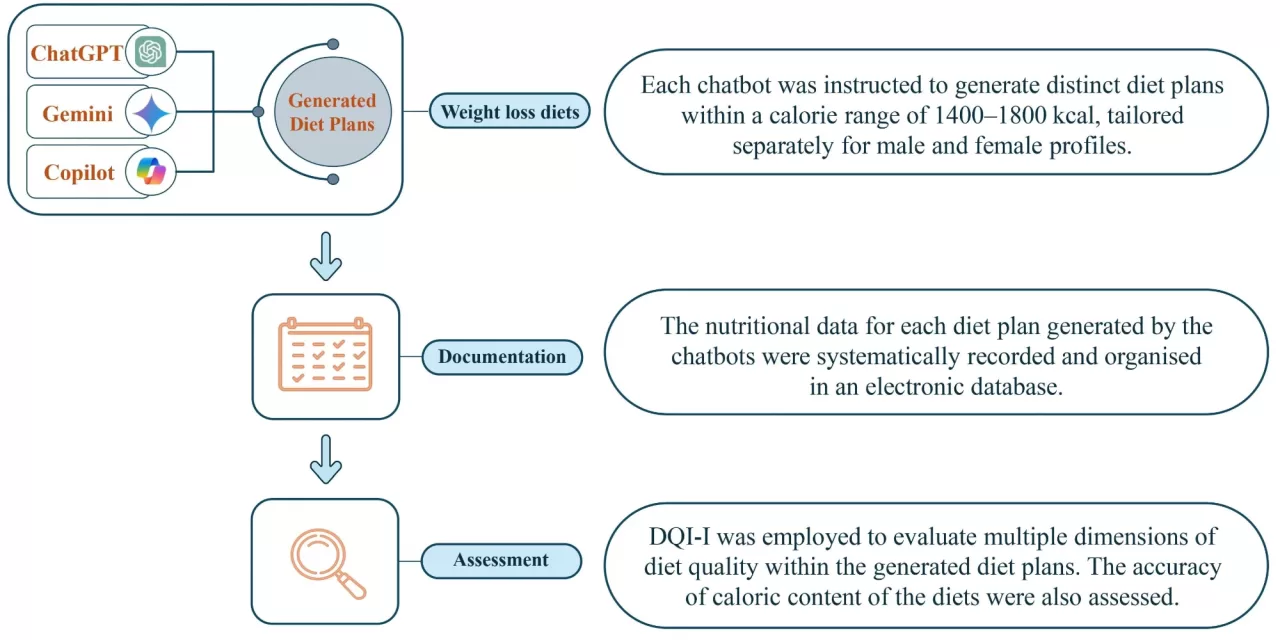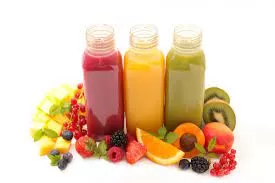A study published in Nutrients journal sheds new light on the effectiveness of AI-driven chatbots in designing personalized weight-loss meal plans. Conducted by researchers from Amasya University, Turkey, and the University of Pécs, Hungary, the study compares the efficiency of three widely-used AI chatbots in generating nutritionally balanced diet plans: Gemini, Microsoft Copilot, and ChatGPT 4.0.
The Rise of AI in Nutrition
As artificial intelligence continues to permeate various sectors, its applications in medical and nutritional fields are rapidly gaining popularity. AI chatbots, in particular, are emerging as potential tools for offering personalized dietary guidance. These chatbots use advanced techniques like natural language processing and machine learning to provide dynamic, context-specific responses, simulating human-like interactions to help users craft their meal plans.
Given their convenience and ease of use, many people are turning to AI-driven chatbots to help guide their nutritional choices. However, concerns have emerged about the accuracy and quality of the meal plans generated by these systems. The latest study aims to evaluate how well AI chatbots can design weight-loss diets that meet established nutritional guidelines.
Study Design and Methodology
The study focused on analyzing and comparing the dietary quality of weight-loss meal plans generated by three prominent AI chatbots. Each chatbot created customized meal plans for male and female profiles, within a caloric range of 1400–1800 kilocalories per day.
The researchers used the Diet Quality Index-International (DQI-I), a well-established tool for assessing the nutritional adequacy of diets, to evaluate the AI-generated meal plans across several dimensions: variety, adequacy, moderation, and balance.
The results revealed high total DQI-I scores for all three chatbots, with ChatGPT 4.0 scoring 71.20 ± 5.2, Microsoft Copilot 72.30 ± 4.1, and Gemini 71.90 ± 4.1. Statistical analysis showed no significant differences in the overall scores (p > 0.05).
Key Findings and Insights
The study revealed several notable findings about the capabilities of AI chatbots in generating balanced diets:
- Diet Quality: All three AI chatbots produced meal plans with high DQI-I scores, suggesting that the diets were nutritionally adequate and diverse.
- Variety in Food Groups: The meal plans designed by Gemini and Microsoft Copilot scored the highest for food group variety, while Microsoft Copilot and ChatGPT 4.0 led in protein source variety.
- Gender Differences: Female-targeted meal plans had higher scores for food group variety and protein source variety, highlighting a potential bias or discrepancy in how the AI chatbots tailor plans for different genders.
- Caloric Accuracy: ChatGPT 4.0 was the most accurate in adhering to the requested caloric targets, with less than 20% deviation from the specified caloric range. In contrast, 50% of Gemini’s meal plans deviated by more than 20%, revealing significant limitations in its caloric adherence.
However, a critical limitation was noted in all three chatbots: their difficulty in balancing macronutrient and fatty acid distribution. Despite producing meals that met general caloric and nutritional needs, the AI systems struggled to optimize the balance between carbohydrates, proteins, and fats—especially in the context of weight-loss diets.
The AI Challenge: Macronutrient Balance
The study suggests that AI chatbots face significant challenges in allocating limited calories across macronutrients, particularly when designing weight-loss diets. Achieving the optimal ratio of carbohydrates, proteins, and fats, while also meeting users’ energy requirements, is a complex task that these algorithms still struggle to perform accurately.
This difficulty is compounded by the need for a precise balance of fatty acids, which are essential for maintaining cellular function and cardiovascular health. Poorly balanced fatty acids—such as high levels of saturated fats and low levels of polyunsaturated fats—are linked to adverse health outcomes, highlighting the importance of this component in diet planning.
Significance and Future Directions
While AI chatbots demonstrate promise in generating nutritionally adequate and diverse meal plans, the study concludes that these systems should be used as tools to complement, rather than replace, the expertise of dietitians. The researchers stress that nutritionists should evaluate AI-generated plans before they are recommended to users, particularly to ensure the proper balance of macronutrients and fatty acids.
The study also points to the need for further research and refinement of AI algorithms, especially in relation to macronutrient and fatty acid distribution. As AI chatbots continue to evolve, their potential to assist in personalized nutrition is vast, but challenges remain in ensuring that their outputs meet the complex and individualized needs of users.
In summary, while AI chatbots like ChatGPT 4.0, Microsoft Copilot, and Gemini can create effective weight-loss meal plans, more work is needed to address their limitations in designing balanced macronutrient profiles. These findings open the door to the future of AI in nutrition, urging collaboration between technology and nutrition professionals to ensure the health and well-being of users.
Journal Reference: Kaya Kaçar, H., Kaçar, Ö. F., & Avery, A. (2024). Diet Quality and Caloric Accuracy in AI-Generated Diet Plans: A Comparative Study Across Chatbots. Nutrients, 17(2), 206. DOI: 10.3390/nu17020206. Link to study












